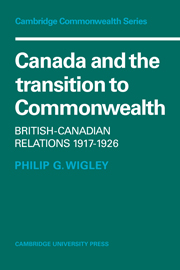Book contents
- Frontmatter
- Contents
- Abbreviations
- Preface
- Introduction
- 1 The threshold of responsibility, 1900–1916
- 2 New departures, 1917–1918
- 3 The settlement of peace, 1919
- 4 Unity and equality, 1919–1921
- 5 The centre cannot hold
- 6 Canadian diplomacy and Imperial diplomacy: 1923
- 7 From Lausanne to Locarno
- 8 The 1926 Imperial Conference: equality defined
- Conclusion
- Bibliography
- Index
- Frontmatter
- Contents
- Abbreviations
- Preface
- Introduction
- 1 The threshold of responsibility, 1900–1916
- 2 New departures, 1917–1918
- 3 The settlement of peace, 1919
- 4 Unity and equality, 1919–1921
- 5 The centre cannot hold
- 6 Canadian diplomacy and Imperial diplomacy: 1923
- 7 From Lausanne to Locarno
- 8 The 1926 Imperial Conference: equality defined
- Conclusion
- Bibliography
- Index
Summary
In 1976 we are witnessing the elaborate celebrations marking the bicentenary of the Declaration of Independence, the point at which two hundred years ago thirteen of Britain's American colonies began their revolution and broke away from the first British empire. Less acknowledged will be the fiftieth anniversary of another such declaration, one whose language was avowedly not revolutionary but which in its own way effectively proclaimed the independence of Britain's self-governing colonies from what was briefly known as the third British empire. The Balfour Declaration of 1926 was an agreed manifesto, setting out the equality of Britain and the dominions and their individual autonomy within the commonwealth association. It attempted in this way to measure and define their post-war relationship to each other, to incorporate into appropriate constitutional terms the far-reaching developments that had been taking place, piecemeal and de facto, over the previous decade. No revolutionary wars were needed to make good the claims advanced here for the dominions, because by 1926 (with the possible exception of the Irish Free State) they were generally satisfied that their status was both adequate and secure. The Balfour Declaration thus represented as much a retrospective analysis as a prescription for future change, and it is with these ten years or so which lead up to this moment of definition that this study will be concerned.
- Type
- Chapter
- Information
- Canada and the Transition to CommonwealthBritish-Canadian Relations 1917–1926, pp. ix - xPublisher: Cambridge University PressPrint publication year: 1977



